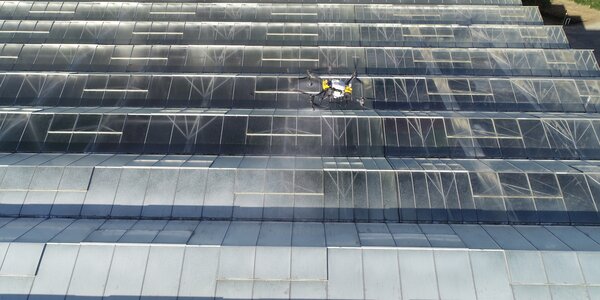Cost-efficient greenhouse coating and cleaning with Drone Dog in New Zealand
Due to strict health & safety regulations, growers and contractors in Australia and New Zealand are not allowed to perform work on greenhouse rooftops. That makes coating and cleaning a greenhouse cumbersome and expensive. Drones offer a solution on both counts. So Steve Wrigley of Auckland, NZ-based contractor Drone Dog is seeing his customer base grow rapidly.
After 20 years of developing and selling biostimulants for agriculture and horticulture, Steve Wrigley embraced a new, technology-driven development a few years ago: crop monitoring and spraying operations using drones. “Even before covid, I started getting interested in drones,” the entrepreneur looks back. “They are light, mobile and widely applicable, especially within the agricultural sector.”
Wrigley's first drone was relatively light and equipped with a multispectral camera for crop monitoring. This allowed him to image spots where crops were underperforming due to drought or nutrient deficiencies, had been affected by pests and diseases or suffered from poor soil structure. At the same time, he was building a drone of heavier caliber, intended for spraying operations.

Steve Wrigley, Drone Dog
Suitable equipment
“Building a drone myself proved more difficult than thought, but soon larger drones were introduced with a decent carrying capacity, including the necessary peripheral equipment such as holding tanks, pumps and suitable nozzles,” Steve continues. “I've had experience with that over the past two years. We perform both full-field crop spraying and spraying of glass greenhouses and polytunnels to clean or apply solar control coatings. The choice of agents lies with the customers, but we or the advisors of distributor Horticentre can help them with this.”
Specific products
Steve's first coating job with ReduSol involved a greenhouse of a few thousand square feet. Apparently there was a need for his services, because both the number of customers and the average greenhouse area are on the rise. “Last year we treated 7 hectares of greenhouses via drones, both glass and polyfilm. We will go well over that this season, with a 2-hectare greenhouse as our largest project. In line with professionalization and economies of scale, growers are becoming more aware of the added value of specific coatings and cleaners, such as ReduSol, ReduFuse and ReduFuse IR, ReduHeat and ReduClean. Distribution in New Zealand is handled by Horticentre Group, which has branches throughout the country.
Spraying in two directions
Wrigley is very pleased with the ease of application of ReduSystems' products and with their spray pattern. “Usually we apply 1,200 liters of spraying solution per acre,” he says. “By flying in two directions at right angles, you get a nice, homogeneous coverage. Per flight of over five minutes, we can spray 40 liters, after which the tank is refilled and, if necessary, the battery changed. Thirty flights are usually required for 1 hectare of greenhouse cover.”
So far, Steve is getting a lot of positive feedback. Customers are very satisfied with the spray result and see that their crops under a coated deck experience less stress and perform better. “One customer told me he was even able to harvest 40% more cucumbers in the previous season”, he states. “Most likely that won't have been due to the coating alone, but it does make you happy to hear reports like that.”
Growth prospects
Most of New Zealand’s greenhouses are located in the Auckland area, but Drone Dog also has clients elsewhere on the North Island. Wrigley sees plenty of opportunity to expand the business. “Horticulture in our country is becoming more intensive, large-scale and sophisticated, and the area of greenhouses will continue to grow steadily for the foreseeable future,” he expects. “New technology is being embraced with increasing ease. That helps us achieve growth and make our operations more efficient.”
For most jobs, Wrigley himself serves as operator, while business partner Jennifer Loo manages home base and administrative duties. On larger jobs, the entrepreneur receives assistance from a part-time employee. “Our spraying activities are currently pretty evenly split between crop protection, treating roofs against moss and algae growth, and coating and cleaning greenhouse rooftops,” summarizes the drone entrepreneur. “There is still room for growth in each of these three market segments, so we look to the future with confidence.”